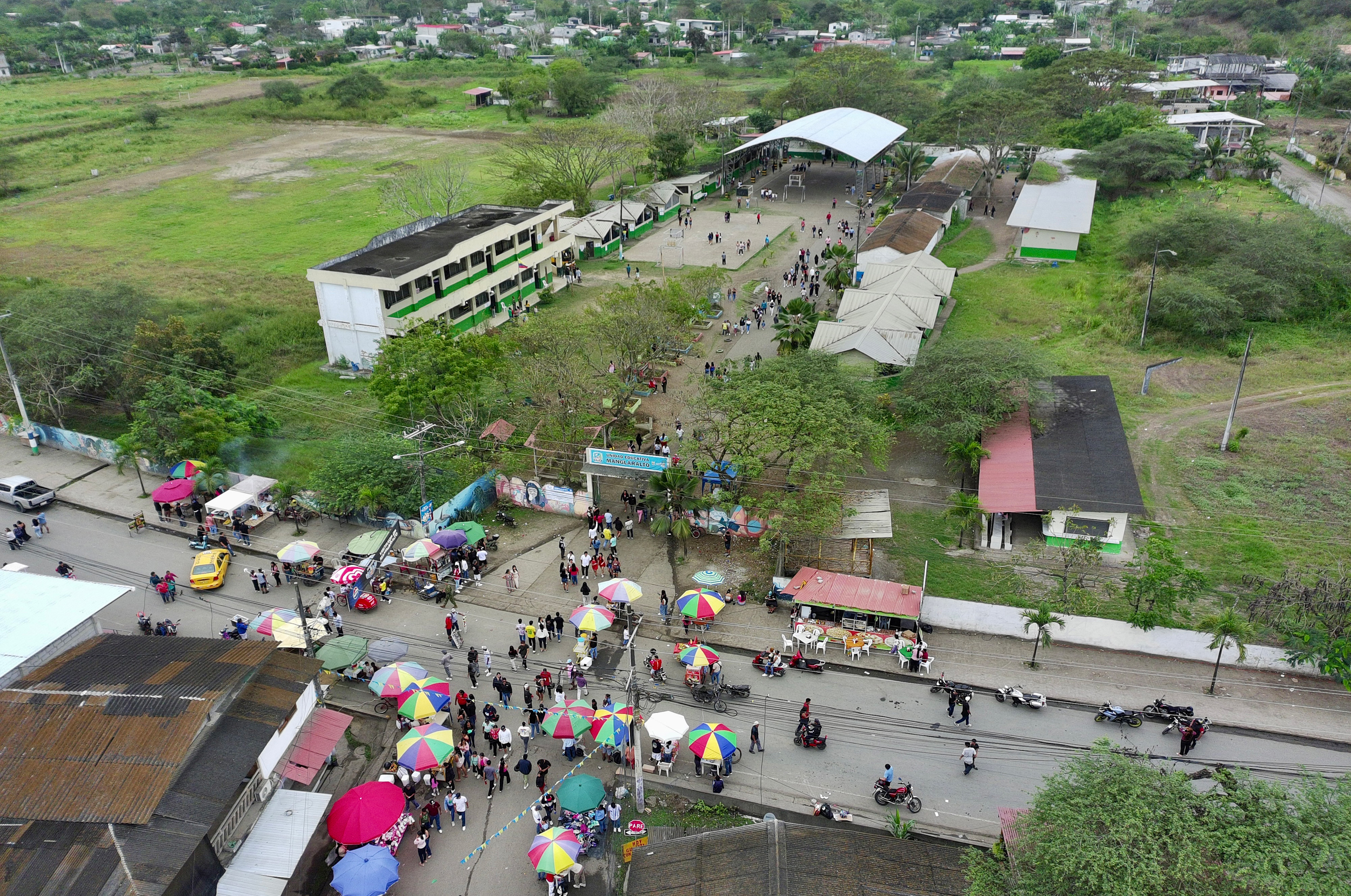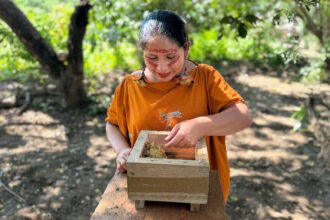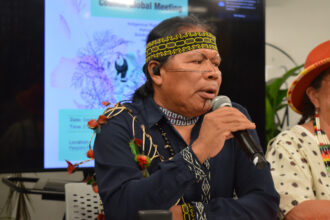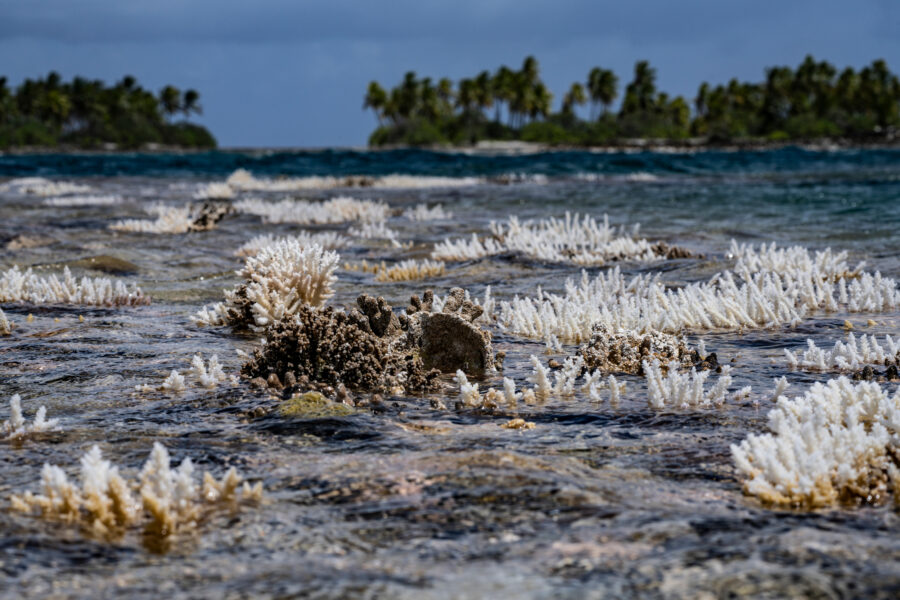Ecuadorians on Sunday rejected their president’s attempt to rewrite the constitution, a move that would likely have doomed the world’s only constitutional recognition of the rights of nature.
Nearly 62 percent of voters opposed President Daniel Noboa’s request to convene a constituent assembly to overhaul the constitution.
Since Ecuador recognized nature’s inherent rights to exist and regenerate in 2008, wild animals, coastal marine ecosystems, forests, rivers and other natural entities have prevailed in court against the government and polluting industries, including mining companies. The precedents have rippled worldwide, as has voters’ affirmation of the constitution that made them possible.
“This is a landmark victory not only for the Ecuadorian Indigenous and environmental movements, but also for the millions of people in Ecuador and around the world who stand for nature and democracy,” said César Rodríguez-Garavito, director of the More-Than-Human Life (MOTH) Program at New York University School of Law.
Noboa had argued the Ecuadorian constitution constrained him from fighting violent crime, though environmental groups saw other motivations at play. Since taking office in 2023, he has significantly weakened environmental protections while courting multinational mining companies. His administration has also targeted environmental defenders. One, Efraín Fueres, was shot and killed by state security forces in September while marching in protest of the government.
In recent years, Ecuador has become a major transit hub for drug-trafficking organizations and the illegal mining operations that fuel them. From 2020 to 2023, the country had a nearly sixfold increase in the national homicide rate. Amid the violence, Noboa has aggressively sought to expand oil and mining operations throughout the country, one of the world’s most biodiverse regions and home to more than a million Indigenous people, including uncontacted and recently contacted Waorani groups.
Noboa has drawn Ecuador closer to the Trump administration, forging tighter security and economic ties. Before Sunday’s referendum, Noboa hosted U.S. Homeland Security Secretary Kristi Noem. The two toured potential sites for a U.S. military base.
But on Sunday, voters also resoundingly rejected a proposal to amend the existing constitution to allow foreign military bases in the country, along with proposals to reduce the number of members in the national legislature and eliminate state funding for political parties.
This was Noboa’s second attempt in two years to use a popular referendum to advance legal changes aligned with his pro-business and security agenda. In April 2024, voters approved a package of security measures aimed at combating the surge of organized crime, but they rejected a measure that would have allowed foreign investors to sue Ecuador through international arbitration, a mechanism called investor-state dispute settlement that is favored by mining and oil companies.
Environmentalists and Indigenous organizations that led nationwide protests earlier this year against Noboa’s crackdown on environmental defenders and his economic policies celebrated Sunday’s results.
“This is a win for life, for nature, for Earth defenders,” said Natalia Greene, an Ecuadorian and director of the Global Alliance for the Rights of Nature.
Greene attributed the referendum’s outcome to an “organic and diverse” campaign by Ecuadorians and their international allies, such as South Africa-based Wild Law Institute and the Argentine Association of Environmental Lawyers, that focused on preserving nature’s rights and the rights of Indigenous peoples.
“The triumph of the no vote on all four questions is the clear response of a country that said no to authoritarianism, no to lies, no to the abuse of power,” said the country’s largest Indigenous organization, Confederation of Indigenous Nationalities of Ecuador (CONAIE), in a social media post Sunday.
In recent months, the Noboa administration has targeted CONAIE and dozens of other Indigenous and environmental organizations and leaders, freezing their bank accounts and referring some to prosecutors on allegations of “unjustified private enrichment” or financing terrorism—accusations the groups vigorously deny. According to Ecuadorian civil society organizations, those groups collectively protect more than 35 million hectares of Amazon rainforest across Ecuador and Peru.
The Ecuadorian Consulate in Washington, D.C., did not immediately respond to a request for comment. Noboa, in his own social media post Sunday, said he would “respect the will of the Ecuadorian people” and would “continue to fight tirelessly” using “the tools that we have.”
This year, his administration overhauled plans for protected ecosystems and announced their intent to auction dozens of rights to oil and gas projects, many of which overlap with Indigenous territories. The government has also eliminated the environment ministry, shifting its functions under the business-focused Ministry of Energy and Mines while courting mining investments.
These moves have drawn mounting resistance from many environmental and Indigenous organizations that rely on the constitution’s strong protections for nature and Indigenous peoples.
“Despite threats, attempts to silence us, … today we have raised our voices, the voices of the jungle and Mother Earth, and we have said enough is enough,” said Zenaida Yasacama, director of the Indigenous-led organization Amazon Sacred Headwaters Alliance.
Zenaida, in a statement written in Spanish, called the referendum results a “historic triumph” for Indigenous peoples and said voters rejected “the national government’s policies that sought to open the door to more mining, oil, and logging, destroying our territories.”
“This victory is not only ours: it belongs to all Ecuadorians,” Zenaida added.
Ecuador has become a beacon for the fast-growing rights of nature movement, inspiring laws and declarations around the world. Today, there are more than 400 such developments, including national laws and court rulings in Spain, Panama, New Zealand, Uganda, Colombia and Brazil.
The laws, however, have not stopped the expansion of extractive industries or produced an explosion of litigation. In Ecuador, rights of nature and other environmental victories have been hard fought and difficult to enforce.
Last week, the Ecuadorian environmental group Yasunidos filed a lawsuit that would force the Noboa administration to comply with the results of a 2023 nationwide referendum in which 59 percent of voters chose to end oil operations in a remote area of the Amazon rainforest that overlaps with uncontacted and recently contacted Waorani territories. The government said last year it would take until 2029 to phase out more than 200 oil wells in the Ishpingo, Tambococha and Tiputini fields.
Greene said the Noboa administration also has not banned mining in the Quito area as required by another measure from that 2023 referendum.
“The government has said it will uphold the popular will. It should honor Ecuadorians’ decision to keep oil underground in Yasuní and respect the tenets of democracy, from civil society organizations to the Constitutional Court,” said Rodríguez-Garavito of NYU’s MOTH program.
About This Story
Perhaps you noticed: This story, like all the news we publish, is free to read. That’s because Inside Climate News is a 501c3 nonprofit organization. We do not charge a subscription fee, lock our news behind a paywall, or clutter our website with ads. We make our news on climate and the environment freely available to you and anyone who wants it.
That’s not all. We also share our news for free with scores of other media organizations around the country. Many of them can’t afford to do environmental journalism of their own. We’ve built bureaus from coast to coast to report local stories, collaborate with local newsrooms and co-publish articles so that this vital work is shared as widely as possible.
Two of us launched ICN in 2007. Six years later we earned a Pulitzer Prize for National Reporting, and now we run the oldest and largest dedicated climate newsroom in the nation. We tell the story in all its complexity. We hold polluters accountable. We expose environmental injustice. We debunk misinformation. We scrutinize solutions and inspire action.
Donations from readers like you fund every aspect of what we do. If you don’t already, will you support our ongoing work, our reporting on the biggest crisis facing our planet, and help us reach even more readers in more places?
Please take a moment to make a tax-deductible donation. Every one of them makes a difference.
Thank you,













